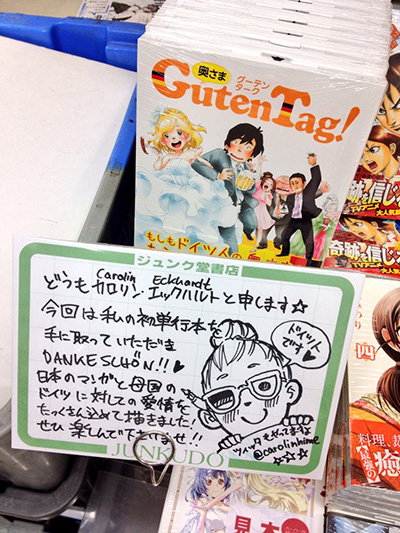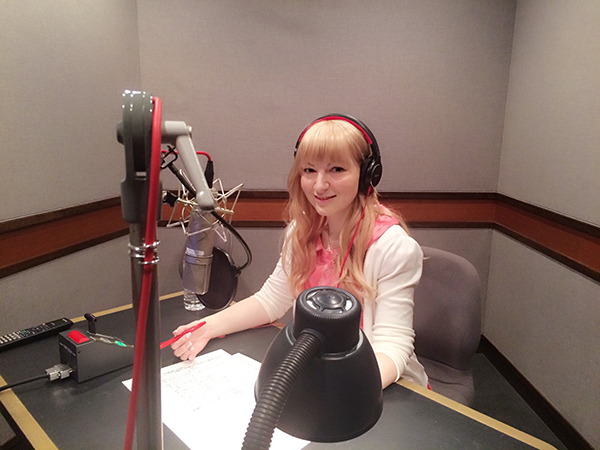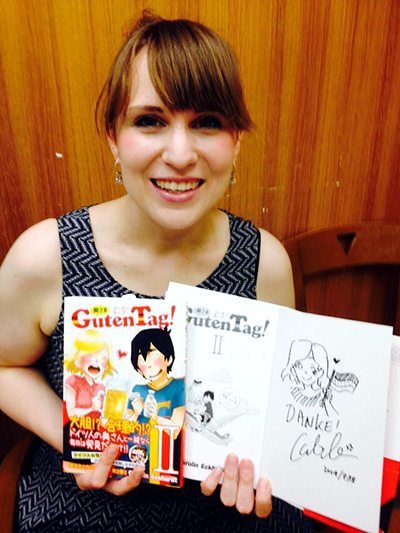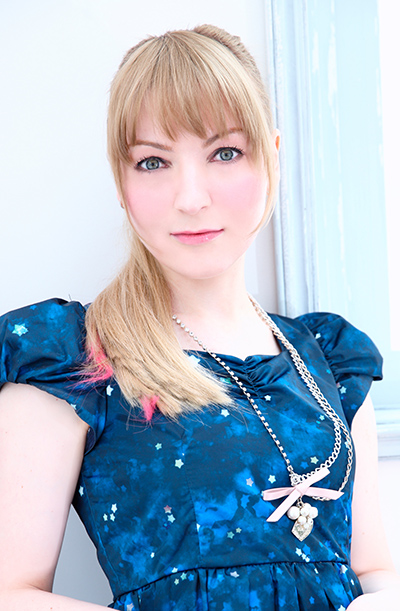Motivation to Study Japanese, Learning Methods, and the Appeal of the Japanese Language: Tips from Foreigners Who Apply Their Japanese Language Proficiency in Their Careers
[Part 2]
Marty Friedman (Musician)
Carolin Eckhardt (Manga Artist)
Jenya (Voice Actress)
Japanese pop-culture, like anime, manga, and J-pop, is attracting global attention, and this trend has boosted interest in the Japanese language. The Japan Foundation has just released the results of its Survey on Japanese-Language Education Abroad 2015, but even the results of the 2012 survey shows that there are already nearly four million Japanese-language learners around the world. In fact, this does not include learners studying Japanese alone using television, radio, the Internet and other means, so the actual number of people studying Japanese must be considerably higher. So what motivates foreign people to study Japanese, and what learning methods do they apply? Also, what is their impression of the Japanese language? In order to find answers to these questions, we asked three foreigners fluent in Japanese--musician Marty Friedman (the U.S.), manga artist Carolin Eckhardt (Germany), and voice actress Jenya (Russia)--about their approach to studying Japanese and the reasons they felt attracted to it.
The appeal of the Japanese language: expressions, characters, and sounds that cannot be found in one's mother tongue
Despite their different learning approaches, Marty, Carolin, and Jenya have demonstrated their Japanese language proficiency. Still, it appears that their learning process was not without difficulties.
What made Carolin confused were the nuances in the language.
"In Japanese, there are many vague expressions, so I often had trouble understanding what exactly the other person was trying to convey. Even today, I find it very difficult to distinguish between a person's public face and private face," laughs Carolin.

Aiming to become a manga artist, Carolin enrolled in a vocational school in Sapporo, and made her long-cherished dream come true in 2012. © Carolin Eckhardt/Shueisha
Jenya says that Chinese characters are her weak point.
"I learned Japanese through the ears, by watching anime and listening to music, so reading and writing took a back seat. I can write hiragana and katakana, but I am still not good at kanji. That is because I use computers to type text, so there are almost no opportunities for me to write kanji by hand. I believe that I need to polish my conversational Japanese and intonation rather than acquire handwriting skills."
As for Marty, he is truly fascinated by kanji although he still seems to struggle with them on a daily basis.
"First of all, kanji look beautiful. Also, unlike the alphabet, each kanji has a meaning, which is fascinating. It is impossible to memorize all kanji no matter how hard one may try, so studying kanji is an eternal pursuit. I always tell foreigners who study Japanese that kanji are not scary. Once you realize how interesting they are, you will never get fed up with studying Japanese."
By the way, some of Marty's favorite Japanese expressions are Ju-nin to-iro (So many people, so many minds), Ichi-go ichi-e (Every encounter is a once-in-a-lifetime encounter), and U-yo kyoku-setsu (twists and turns). Such expressions are known as yojijukugo, or idiomatic phrases composed of four Chinese characters.

Marty Friedman has been living in Japan for 13 years now. He is active as a guitarist, songwriter, and music producer.
Jenya, who is not so good at kanji, pointed out the harmonious sounds of the Japanese language as its most attractive feature. It was also her first impression of the language.
"Japanese is easy to set to rhythm. It sounds so adorable that it is pure pleasure to speak it! I like the complicated honorific expressions, but I still find them quite difficult. It would be nice if I learn to speak the honorific language smoothly."
Carolin is fascinated by some unique Japanese expressions that do not exist in her native German language, such as, Itte kimasu ("Off I go," a phrase said by a person leaving), and Itte rasshai ("See you later," a phrase said by a person staying).
"Still, Itte kimasu is not simply 'off I go.' To me, the phrase means 'I am going, but I will come back.' Such a simple phrase, yet it gives a sense of security to the person staying behind. As for Itte rasshai, normally it means 'Take care,' but depending on the situation it could also mean 'Make sure you come back,' 'You are always welcome,' or 'Let's make sure we meet again.' It is a simple phrase, yet a wonderfully profound one. In German, there are no phrases equivalent to Itte kimasu and Itte rasshai."
Perhaps there are merits and appealing aspects of the Japanese language that can be seen only from the perspective of foreign people. Maybe the abundant vocabulary and expressive richness of the language are what Japanese people should appreciate more and not take for granted.
The best learning method: keep on using Japanese language in conversations with Japanese people
In the interviews, we asked Marty, Carolin, and Jenya about learning methods they would recommend to Japanese-language learners.
Jenya highlighted the necessity of a sense of purpose as the most important thing.
"First, people studying the language must ask themselves: Why do I want to learn Japanese? If their goal is to become interpreters, they should converse with various people and watch TV dramas and anime series. If they want to become translators, they should read Japanese texts and practice writing in their native language. It is important that they approach the Japanese language in a learning environment that matches their goals.
There is one more thing. If you live in Japan and study Japanese, it is pointless to always hang out with friends from your country. You are surrounded by Japanese native speakers, so it is wasteful to not create as many opportunities as possible to practice your conversational skills."

As a voice actress, singer, and TV personality, Jenya is engaged in a broad range of activities in anime, television, and live performances.
Carolin, too, responded with a comment about the importance of exposure to the Japanese language.
"There is no need to speak perfectly, so do not be afraid to use Japanese. Even if you are not confident about some grammar structure you have just studied, try using it in a context different from the examples in your textbook. If you are hesitant to use Japanese for fear that you may make mistakes, you will never improve. Only after saying something out loud, you will know whether the Japanese you used was correct or wrong. When you say something correctly, you will gain confidence, which will push you to improve further."
Carolin has one more piece of advice.
"It is a waste of time if you just listen with only half an ear when you watch TV. You have to focus and really listen, regardless of the genre of the program - news, variety shows, talk shows, animation, etc. As for manga, perhaps it is a good idea to start with stories that have furigana (syllabic characters) printed next to the kanji to indicate their pronunciation. Next, move on to manga without furigana, then try reading novels in Japanese. I think such step-by-step progress is an effective way to learn Japanese."
The learning method recommended by Marty is one that he has applied himself.
"Watching TV, reading magazines, and listening to music are all good ways to learn, of course, but they are meaningless if the learner is not truly interested in the content. Listen to music that matches your tastes, read books that really interest you. In my case, I 'absorbed' Japanese through the world of Japanese music, which was closely related to my work and life, so I enjoyed learning and had many opportunities to practice my Japanese. In order to further improve their proficiency, learners should place themselves in situations in which they absolutely must speak in Japanese. The psychological pressure of having to speak will help them improve. This is by far the best and most effective learning method."
Using Japanese proactively in conversations with Japanese people without being nervous or shy is the best learning method. This is the message that stands out from the advice given by Marty, Carolin, and Jenya. Practice makes perfect, indeed.
Marty offers the following words of encouragement to Japanese-language learners:
Do not miss any opportunity to speak, listen, read, or write in Japanese, and you will become proficient in Japanese.
Here is a message from Carolin: Find the approach that is best suited to you
hat do you find the most enjoyable when you study? Is it writing? Or maybe speaking? Find your own way and build your own "relationship with the Japanese language."
Jenya, who says she feels happy when she speaks in Japanese, insists that "learning to speak even a single foreign language will change your life.
It happened to me. I can assure you that learning a new language will make previously impossible things possible and will open new doors for you."
We hope that all learners of foreign languages among our readers will benefit from the experience and approach learning like these foreign artists who fully utilize their language proficiency in their work.
(Text: Sayuri Saito)

Marty Friedman
Marty Friedman was born in Washington D.C., U.S.A. After playing in various bands, such as Cacophony, in 1990 he joined the world-famous metal band Megadeth. After playing with them for 10 years as the lead guitarist, he left Megadeth and in 2003 moved to Japan, drawn by his fascination with J-pop. Since then, he has been active on the Japanese music scene in a broad range of creative fields as a guitarist, songwriter, and music producer, and also applies his multiple talents in television, radio, and cinema. In 2014, Marty Friedman released his solo album Inferno (Universal). He is also the supervisor of "Jojo no Kimyo na Boken" de Eigo wo Manabu! [Learn English with JoJo's Bizarre Adventure!], an innovative English study guidebook published by Shueisha.
Carolin Eckhardt
Carolin Eckhardt was born in Potsdam, Germany. She started learning Japanese at the age of 13 and aspired to become a manga artist in Japan. As a high school student in Potsdam, she enrolled in a study abroad program and attended a high school in Sapporo City for one year (2004-2005). After graduating from high school in Potsdam, she returned to Sapporo in 2007 and enrolled in Sapporo Manga Anime Gakuin, a vocational school. After graduating, she joined the school as an assistant teacher in 2010 while drawing manga. She made her debut as a manga artist in 2012 with her serialized manga. The series ended in 2014, inspiring her to leave Sapporo, her home for the past seven years, and move to Tokyo in search of new challenges.
Jenya
Jenya was born in Novosibirsk, Russia. She graduated from the IT Department of the Novosibirsk State University of Economics and Management. From around 2000, she began uploading audio of herself singing anime songs in Japanese on her website. In 2005, she moved to Japan and began working hard to realize her dream of becoming a professional voice actress. She made her debut in Evangelion: 2.0 You Can (Not) Advance in 2009, and since then has appeared as a voice actress in several anime works, such as Pretty Rhythm: Aurora Dream, Crayon Shin-chan: Very Tasty! B-class Gourmet Survival!!, and Girls und Panzer. At present, she is also active as a singer and a TV personality.
Related Articles
Back Issues
- 2023.12. 7 Movie Theaters aroun…
- 2023.6.16 The 49th Japan Found…
- 2023.4.24 The 49th Japan Found…
- 2022.12.27 Living Together with…
- 2022.12.27 Living Together with…
- 2022.8.12 Inner Diversity <…
- 2022.3.31 The 48th Japan Found…
- 2022.3.29 Beyond Disasters - T…
- 2021.11.29 Crossing Borders, En…
- 2021.4.13 Crossing Borders, En…



